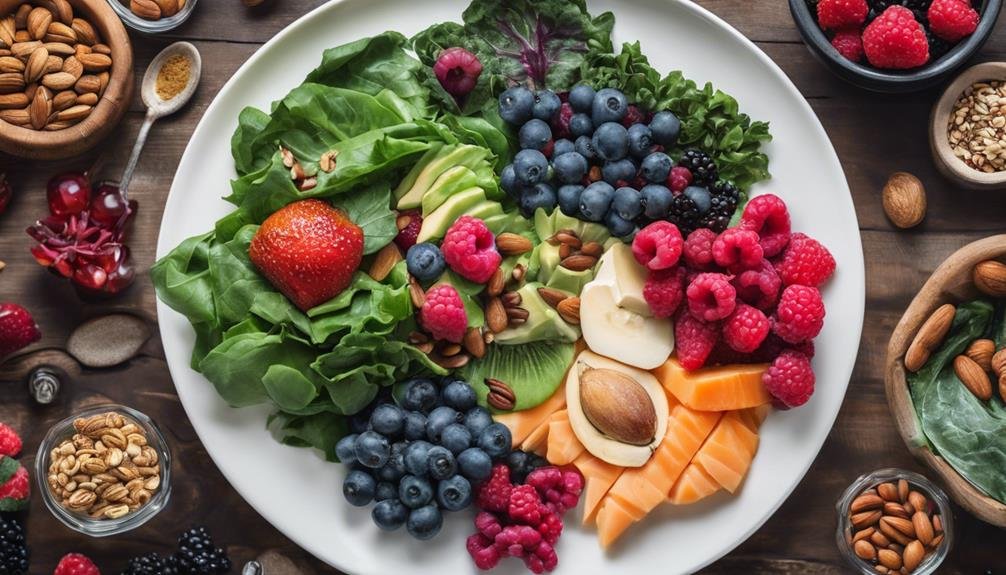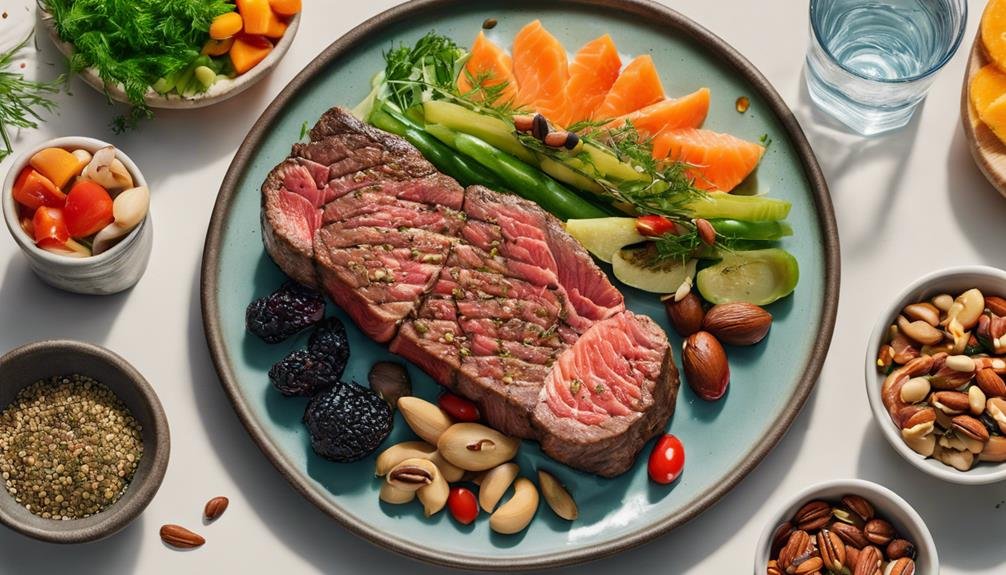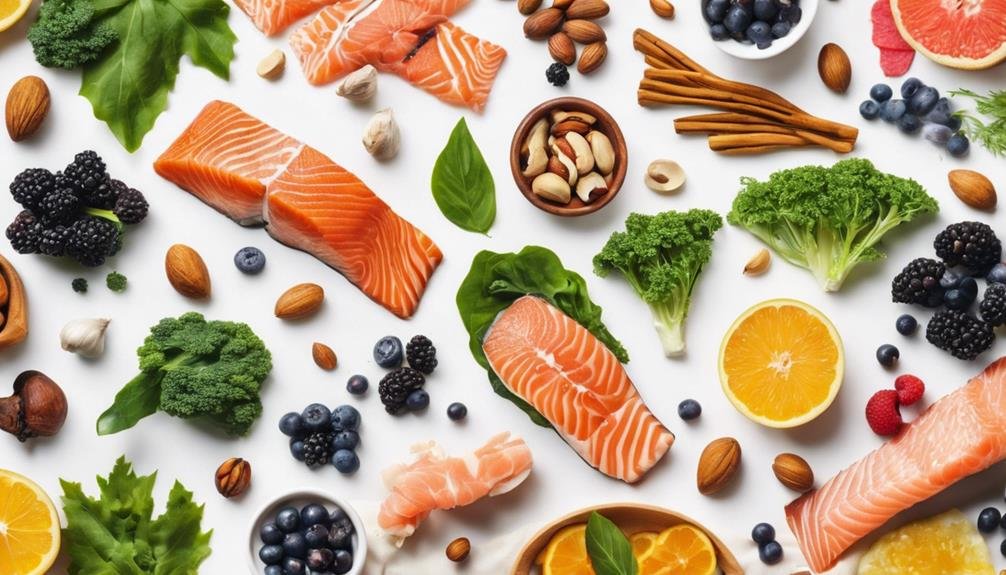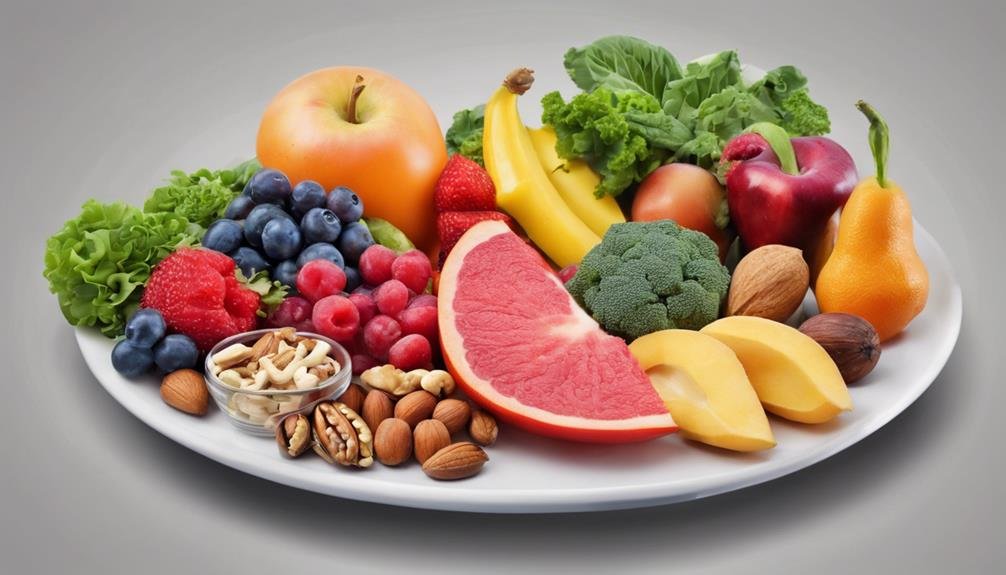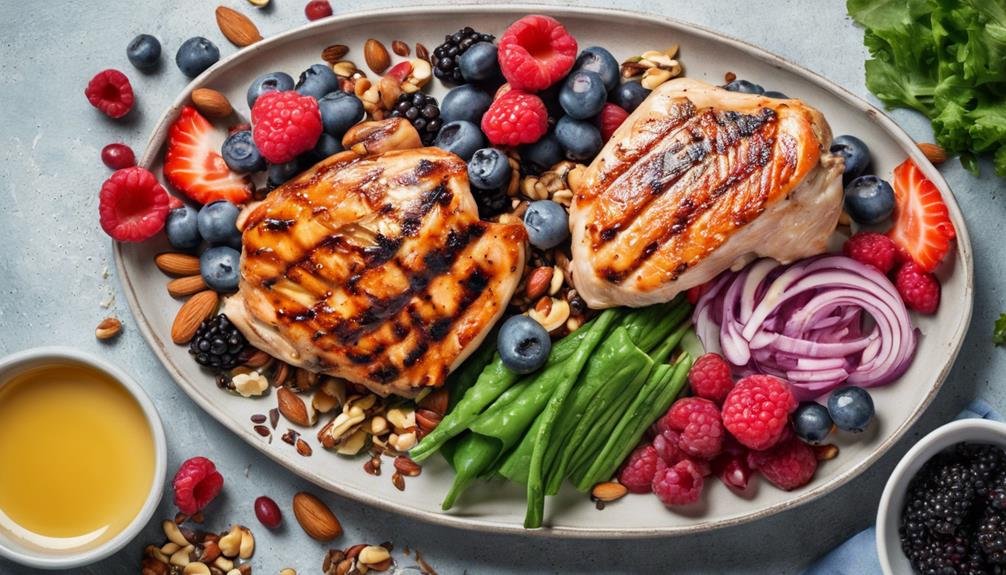When facing a cancer diagnosis, embarking on the Paleo diet can be a mindful choice for your health journey. By understanding the core principles of Paleo nutrition and aligning them with your body's needs post-diagnosis, you can create a foundation for healing and well-being. From stocking your kitchen with wholesome ingredients to planning nourishing meals, each step plays a crucial role in supporting your body during this challenging time. Let's uncover how the Paleo diet can be a valuable tool in your post-cancer recovery and wellness routine.
Understanding the Paleo Diet Basics
If you're considering starting the Paleo Diet after a cancer diagnosis, understanding the basics is crucial. The Paleo Diet focuses on consuming whole, unprocessed foods that our ancestors ate during the Paleolithic era. This includes lean proteins, fruits, vegetables, nuts, and seeds while excluding grains, dairy, processed foods, and sugars.
Embracing the Paleo Diet can be a positive step towards supporting your body during cancer treatment. By eliminating processed foods and focusing on nutrient-dense options, you provide your body with essential vitamins, minerals, and antioxidants that can aid in your recovery journey.
Remember to consult with your healthcare team before making any significant dietary changes. They can provide guidance tailored to your specific health needs and ensure that the Paleo Diet aligns with your treatment plan.
Starting the Paleo Diet may seem daunting at first, but with patience and support, you can gradually transition to this way of eating. Experiment with different recipes, seek out community support, and listen to your body's cues throughout the process. Your health and well-being are worth the effort.
Benefits of Paleo for Cancer Patients
Considering the benefits of the Paleo Diet for cancer patients, incorporating this nutritional approach into your journey can offer significant support. The Paleo Diet focuses on whole foods, lean proteins, fruits, vegetables, and healthy fats, all of which can aid in boosting your immune system and reducing inflammation. By eliminating processed foods, sugars, and additives, you provide your body with the necessary nutrients to promote healing and overall well-being during your cancer treatment.
Additionally, the Paleo Diet may help regulate blood sugar levels, which is crucial for cancer patients as some cancer cells feed on sugar. This way, you can potentially create an environment less conducive to cancer cell growth.
Moreover, the high antioxidant content in many Paleo-approved foods can combat oxidative stress caused by cancer treatments and reduce cell damage.
Embracing the Paleo Diet can also support your energy levels, digestion, and mental clarity, all of which are vital aspects of your health as you navigate through your cancer journey. Remember, every small change towards a healthier lifestyle can make a significant difference in your overall well-being.
Consulting With a Healthcare Professional
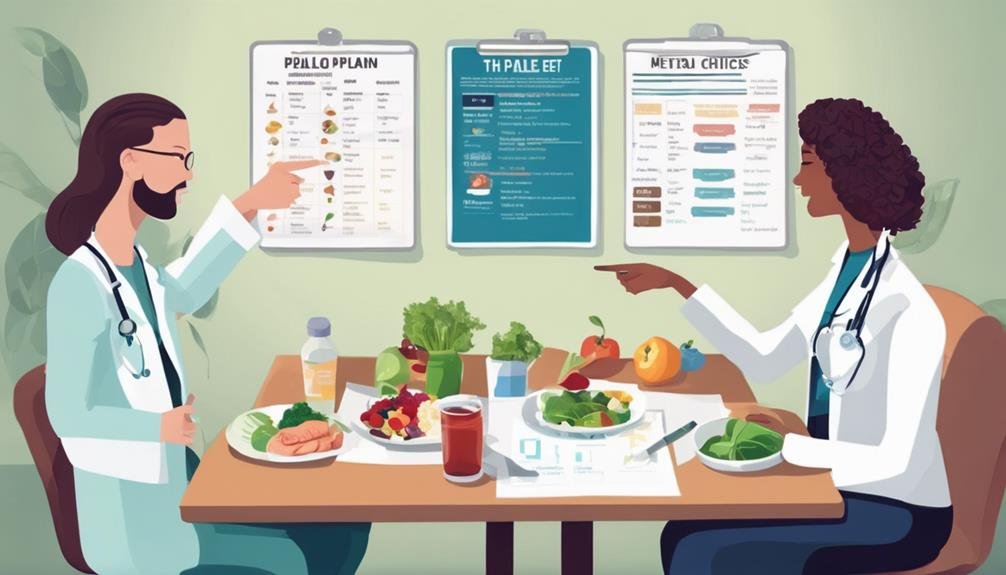
When embarking on the Paleo Diet after a cancer diagnosis, it's crucial to consult with a healthcare professional. Your healthcare provider can offer personalized guidance based on your specific health needs and cancer treatment plan. They can help you navigate the dietary changes, ensuring that the Paleo Diet aligns with your treatment goals and overall well-being.
By consulting with a healthcare professional, you can discuss any potential interactions between the diet and your current medications. They can also monitor your progress and make adjustments as needed to support your recovery journey.
Your healthcare provider can provide valuable insights into how the Paleo Diet can complement your treatment and help you optimize your nutritional intake during this critical time.
Stocking Your Pantry With Paleo Staples
As you embark on your Paleo Diet journey post-cancer diagnosis, stocking your pantry with Paleo staples is a crucial step in setting yourself up for success. By ensuring your pantry is filled with the right ingredients, you'll be better equipped to follow the Paleo lifestyle and nourish your body with wholesome foods.
Start by stocking up on lean proteins like grass-fed beef, free-range poultry, and wild-caught fish. These will be the foundation of many of your meals, providing you with essential nutrients for recovery and overall health.
Next, focus on adding plenty of fresh fruits and vegetables to your pantry. Opt for a variety of colorful options to ensure you're getting a wide range of vitamins, minerals, and antioxidants.
Nuts, seeds, and healthy fats like avocado oil and coconut oil are also essential staples to have on hand for cooking and snacking.
Don't forget to include herbs, spices, and seasonings to add flavor to your dishes without relying on processed ingredients. With a well-stocked pantry full of Paleo staples, you'll be ready to create delicious and nutritious meals to support your health journey.
Planning Balanced Paleo Meals
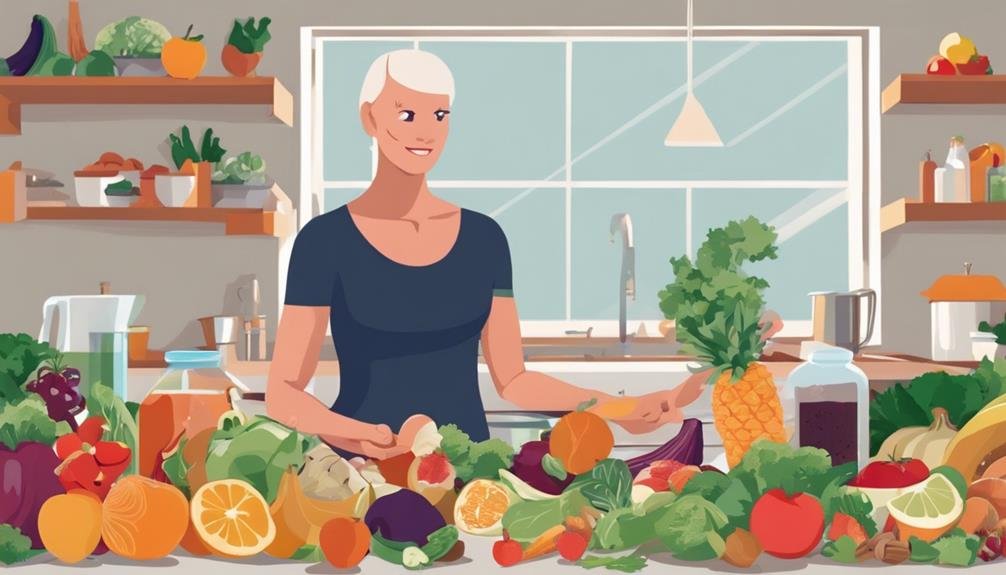
To craft balanced Paleo meals, start by focusing on incorporating a variety of nutrient-dense foods that will fuel your body and support your well-being. Fill your plate with colorful vegetables like leafy greens, bell peppers, and sweet potatoes. These veggies are packed with vitamins, minerals, and antioxidants that can help boost your immune system and aid in your recovery journey.
Include fruits such as berries, apples, and oranges to add natural sweetness and more essential nutrients to your meals.
Don't forget to include healthy carbohydrates like quinoa, brown rice, or sweet potatoes to provide sustained energy throughout the day. These complex carbs can help stabilize your blood sugar levels and keep you feeling full and satisfied.
Incorporating healthy fats from sources like avocados, nuts, seeds, and olive oil can further enhance the flavor of your dishes and support brain health.
Incorporating Lean Proteins and Healthy Fats
For a well-rounded Paleo diet that supports your health and recovery journey, focusing on incorporating lean proteins and healthy fats is essential. Lean proteins such as chicken, turkey, fish, and lean cuts of beef or pork are rich in nutrients that can aid in repairing your body and boosting your immune system. These proteins can help maintain muscle mass and provide energy for your daily activities.
When choosing fats, opt for sources like avocados, nuts, seeds, and olive oil. These healthy fats are packed with antioxidants and anti-inflammatory properties that can support your overall well-being.
To incorporate lean proteins and healthy fats into your meals, consider grilling or baking your protein sources with a drizzle of olive oil. You can also add nuts and seeds to salads or use avocado as a spread or topping. By making these simple swaps in your diet, you can enhance the nutritional value of your meals and promote healing during your cancer journey.
Emphasizing Fruits and Vegetables
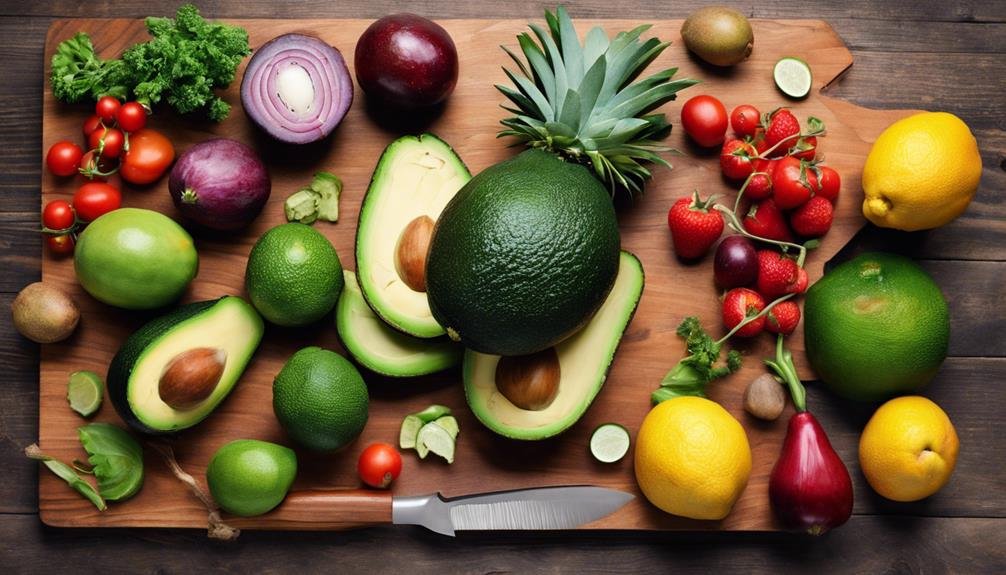
Embracing a rainbow of vibrant fruits and vegetables is a cornerstone of a nourishing Paleo diet for supporting your health during and after a cancer diagnosis. These colorful plant foods are packed with essential vitamins, minerals, antioxidants, and fiber that can help boost your immune system, reduce inflammation, and promote overall wellness.
When following the Paleo diet, focus on incorporating a variety of fruits such as berries, apples, citrus fruits, and vegetables like leafy greens, cruciferous veggies, and root vegetables.
These nutrient-dense foods not only provide your body with the necessary fuel to thrive but also offer a delicious way to add flavor and texture to your meals. Aim to fill half your plate with a colorful assortment of fruits and vegetables at each meal to ensure you're getting a wide range of nutrients.
Avoiding Processed Foods and Sugars
When embarking on the Paleo diet after a cancer diagnosis, a crucial aspect to focus on is steering clear of processed foods and sugars. Processed foods often contain harmful additives and preservatives that can be detrimental to your health, especially when dealing with cancer.
Sugars, especially refined sugars found in sodas, candies, and baked goods, can spike insulin levels and promote inflammation, which is something you want to avoid during this time.
Instead, opt for whole, natural foods like lean meats, fish, fruits, vegetables, nuts, and seeds. These foods are nutrient-dense and can help support your body's natural healing processes.
Staying Hydrated and Mindful of Portions
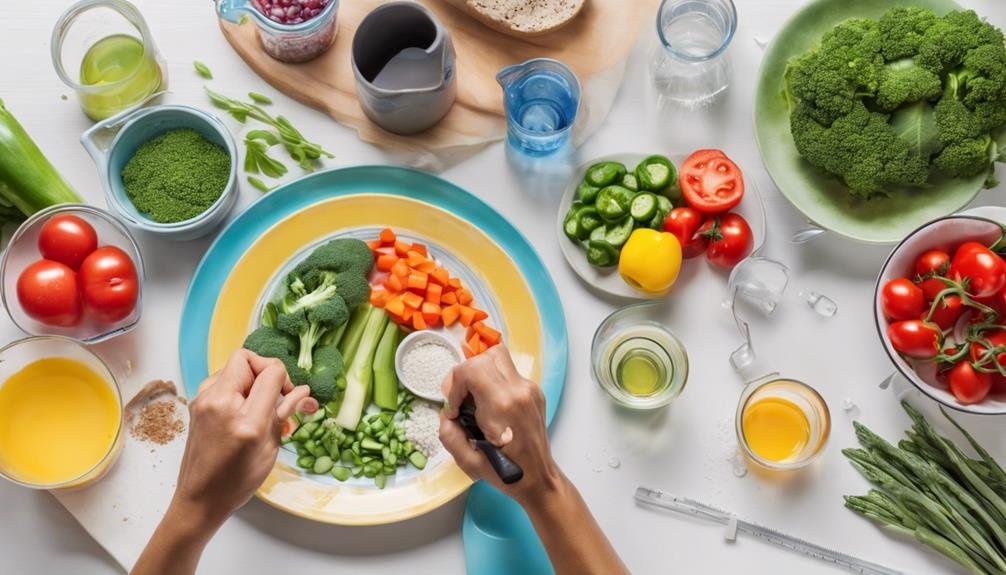
After making the conscious decision to eliminate processed foods and sugars from your diet, the next step is to focus on staying hydrated and being mindful of your portions. Keeping these aspects in check will help support your body in its healing journey. Here are some tips to help you along the way:
- Drink Plenty of Water: Aim to drink at least 8-10 glasses of water each day to stay hydrated and aid in digestion.
- Use Smaller Plates: Opt for smaller plates to help control portion sizes and prevent overeating.
- Listen to Your Body: Pay attention to your body's hunger cues and stop eating when you feel satisfied.
- Include Healthy Fats: Incorporate sources of healthy fats like avocados, nuts, and olive oil to support your overall health.
- Eat Mindfully: Take your time to savor each bite, chew slowly, and enjoy the flavors of your food.
Managing Potential Nutrient Deficiencies
If you've recently transitioned to the Paleo diet after a cancer diagnosis, it's crucial to be mindful of potential nutrient deficiencies that may arise. While the Paleo diet is rich in nutrients, there are certain vitamins and minerals that may need extra attention to prevent any deficiencies.
Iron is one of the key nutrients that you should focus on, especially if you're not consuming red meat regularly. Incorporating more spinach, lentils, and fortified cereals can help boost your iron levels. Additionally, omega-3 fatty acids found in fatty fish like salmon or through supplements can support your overall well-being.
Another vital nutrient to consider is calcium, which is essential for bone health. Including more leafy greens, almonds, and dairy alternatives fortified with calcium can help you meet your needs.
Vitamin D, often lacking in cancer patients, can be obtained from sunlight exposure or through supplements.
Listening to Your Body's Needs

To truly thrive on the Paleo diet after a cancer diagnosis, it's essential to listen attentively to your body's needs. Your body has undergone significant changes, and being in tune with its signals can help you navigate the dietary changes more effectively. Here are some tips to help you listen to your body:
- Stay Hydrated: Drink plenty of water throughout the day to keep your body functioning optimally.
- Pay Attention to Hunger Cues: Eat when you're hungry and stop when you're full. Your body knows best.
- Monitor Energy Levels: Notice how different foods impact your energy levels and adjust your diet accordingly.
- Consider Digestive Health: Be mindful of how your digestive system reacts to certain foods and make adjustments as needed.
- Prioritize Rest and Recovery: Listen to your body's need for rest and give yourself the time to recover and heal.
Seeking Support and Community
Listening to your body's needs is a vital component of embarking on the Paleo diet journey post-cancer diagnosis. During this challenging time, seeking support and community can provide you with the encouragement and guidance you need to stay on track. Joining online forums or local support groups can connect you with individuals who understand your journey and can offer valuable insights and motivation. Sharing your experiences, recipes, and success stories with others following a similar path can create a sense of camaraderie and empowerment.
Additionally, involving your friends and family in your dietary transition can help you feel supported and understood. Educating them about the Paleo diet and how it can benefit your health post-cancer can foster a positive environment for your lifestyle change. Encouraging loved ones to join you in meal preparation or trying out new Paleo recipes together can make the process more enjoyable and strengthen your support system.
Frequently Asked Questions
Can the Paleo Diet Cure Cancer?
While the paleo diet is popular for its focus on whole foods and nutrients, there's no scientific evidence proving it can cure cancer. It's essential to follow your doctor's recommendations and seek evidence-based treatments for cancer.
However, incorporating a balanced diet like the paleo diet can support your overall health and well-being during cancer treatment.
Always consult with healthcare professionals before making significant dietary changes.
How Soon Can I Expect to See Results?
You can typically start seeing initial results within a few weeks of starting the Paleo diet. However, the exact timeline can vary depending on individual factors like adherence to the diet, overall health, and the specific type of cancer.
It's important to stay patient and consistent with the diet, as long-term benefits may take more time to fully manifest. Remember to consult with your healthcare provider for personalized guidance and monitoring.
Are There Any Specific Supplements Recommended?
When considering specific supplements on the Paleo Diet, it's crucial to focus on whole foods for nutrients first. However, some individuals may benefit from additional support through supplements like Vitamin D, Omega-3 fatty acids, or probiotics. Always consult with your healthcare provider before starting any new supplements to ensure they align with your individual health needs and cancer treatment plan.
Prioritizing nutrient-dense foods is key, but supplements can offer added support.
Can I Still Have Cheat Days on the Paleo Diet?
Absolutely! It's okay to have cheat days on the Paleo diet, but moderation is key. Enjoying occasional treats can help you stay motivated and prevent feelings of deprivation.
However, try to make healthier versions of your favorite cheat foods to align better with the Paleo principles.
How Can I Handle Social Gatherings and Restaurants on the Paleo Diet?
Navigating social gatherings and restaurants on the paleo diet can be challenging, but with a little planning, it's totally doable. Start by scanning menus for paleo-friendly options or ask if substitutions are possible. Don't be afraid to communicate your dietary needs politely. Many restaurants are accommodating.
In social settings, focus on enjoying the company rather than the food. Remember, it's all about balance, and occasional indulgences are okay.
Conclusion
Congratulations, you've now unlocked the secret to starting the Paleo diet after a cancer diagnosis! By consulting with a healthcare professional, stocking your pantry with Paleo staples, and planning balanced meals, you're well on your way to a healthier lifestyle. Remember to stay hydrated, listen to your body's needs, and seek support from loved ones and online communities. Embrace the Paleo way and let it fuel your journey towards wellness post-cancer. You've got this!

